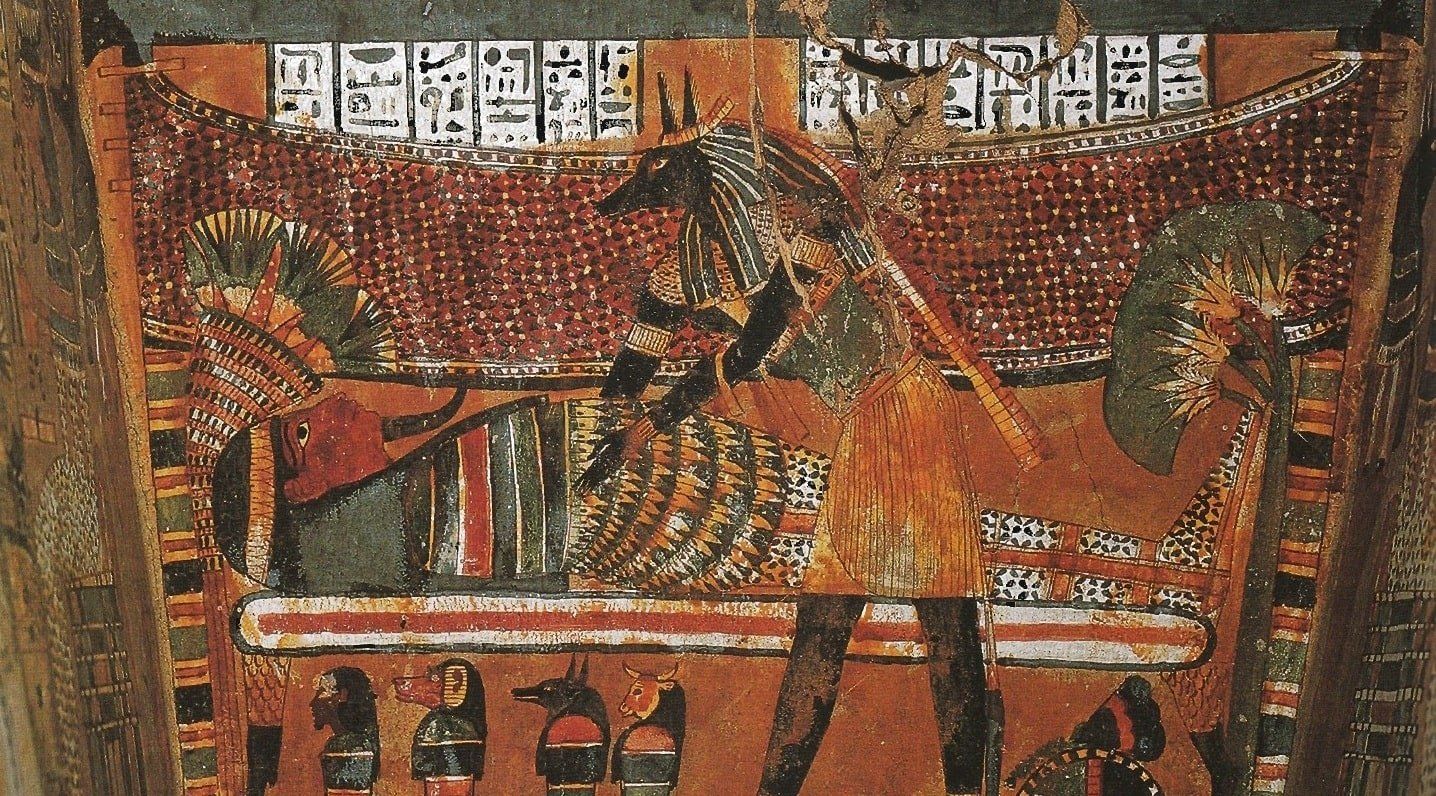Anubis, the Egyptian god
Who Is Anubis?
Anubis is the god of mummification and death in ancient Egyptian mythology. He guided the souls of the dead to their tombs and defended them against evil spirits that threatened to steal their bodies or eat their flesh. His name means "Embalmer." Anubis was a jackal-headed god who guarded over and embalmed deceased Egyptians so that they could enter into the afterlife.
The oldest mention of him in the Old Kingdom (c. 2686–2181 BC) Pyramid Texts depicts him as assisting in weighing a deceased pharaoh's heart, and he later became lord of the underworld during Middle Kingdom times (2055-1650 BC). Priests typically wear masks depicting him per their work.
By the New Kingdom (c. 1550-1077 BC), Osiris replaced Anubis as lord of the underworld. He was left responsible for guarding mummies and guiding souls through their funerary journey. As a god of rebirth, he is sometimes considered to be the protective deity of the deceased, whose mummy is placed within a coffin after first being consecrated by Anubis-themed amulets.
Origin

Anubis was the son of Nephthys. He is shown to be a
jackal or sometimes a man with the head of a Jackal, but he has human skin instead of fur. Indeed, the black coat of Anubis is not proper to nature but symbolic. It represents the discoloration of the corpse after its treatment in natron and the smearing of the wrappings with a resinous substance during
mummification.
Anubis' mummy wrappings are often depicted unrolling from his body and spreading over the ground like death itself had come into existence. The ancient Egyptians knew Anubis as the God of Death. They believed that Anubis had a unique and robust power over their bodies and spirits in the afterlife.
What does Anubis mean?
His name in the Ancient Egyptian Language, "INPW," which means the "embalmer," later became Anubis in the Greek language, which means "god of mummification."
The name Anubis is also translated to convey the meaning of "He who is on his mountain." And let's look at this differently. It can be justified that he was called Anubis because he always took care of what needed to be done with bodies and buried. most probable, he is the evolution of an ancient Egyptian god called "WEP WAWET," which means "Opener of the Ways."
Is Anubis a good god?
Anubis was the god of embalming and mummification. He would guard over a body after death to keep it safe until he could perform his sacred duties as an embalmer. He would take organs out, wrap them up with linen for preservation, dry the outside off, and then put it back together inside. There are many stories about his family tree, and he was also believed to have ruled the underworld.
Anubis is one of those gods that has been around for thousands and thousands of years. He was a god who always stuck with his duty and responsibility as an embalmer no matter what happened in society or the world. Anubis represents values like patience, loyalty, dedication, and tolerance.
Anubis in magic
God Anubis has an important role in magic.in ancient Egypt and till now
For Example:
Knot Spells
Sometimes the role of the knots is to prevent something from happening until the right time, such as the birth of a child. The untying of magic
knots would be an important stage in the ritual. Knotted cords are linked with Anubis,
Love Spells
The magician is to take a bronze bowl engraved with a figure of Anubis, fill it with water, and cover the water with a film of oil. The child medium is to lie on four bricks with a cloth over his head. The magician lights a lamp on one side of the child and a censer on the other. He is then to burn exotic incense and chant an invocation to Anubis repeatedly.
Childbirth and women bleeding spells
Spells that claim to stop bleeding in a woman may have been used against heavy periods or for bleeding after childbirth. Two spells of this kind invoke the magic of Anubis and involve the insertion of a knotted cloth into the vagina. One of these spells attributes the bleeding to the malice of a god or a spirit.
Spells against the evil eye
Anubis was a deity who might act both for and against humanity
God Anubis in modern times till now
As time passed, Anubis lost his popularity as other gods came into existence. However, there are still people around who appreciate and respect his powers. Anubis is a well-known deity in the New Age religion. But, unlike other gods, he sometimes guides people in their day-to-day life. This legend is what his followers tell about him:
"Anubis represents our deepest mind, the silent watcher of our soul. He can come to us like an apparition or dream offering help which we may not be aware of for days afterward."
Conclusion
For centuries, the ancient Egyptians worshipped a god called Anubis. This deity was associated with death and mummification. It was often depicted as a man with the head of an animal (usually a Jackal). There are many different theories about what this may have represented. Still, it is believed that he acted as a guide to those who died to help them reach their afterlife destination successfully. In addition to being involved in funerals, people would also make offerings at his temples for protection from disease or injury during battle. The Egyptian word for offering translates into "anupu," which means something given up by oneself without regret on behalf of another person. Today we still refer to gifts offered as sacrifices when given freely out.
To sum up
If you’re interested in learning more about God Anubis, here are some interesting facts about him:
• He was the son of Osiris and Isis.
• He was the brother of Horus.
• He was associated with the moon.
• He was believed to be able to see into the future.
• He was said to protect travelers.
• He was thought to be the protector of children.
• He was also the patron of embalmers.
• He was sometimes referred to as “the jackal-headed god.”










